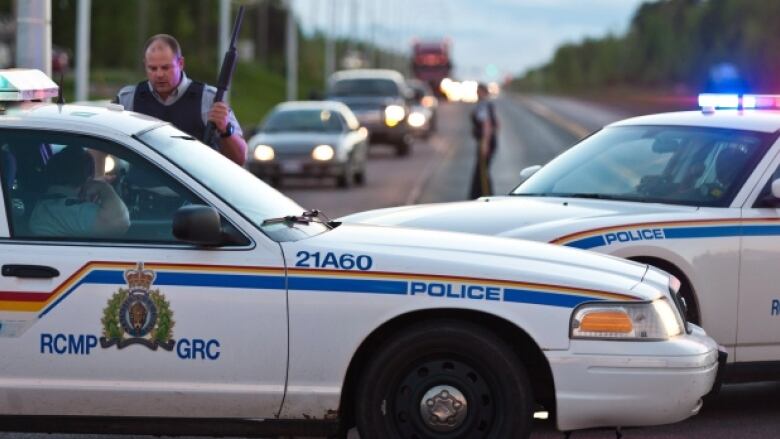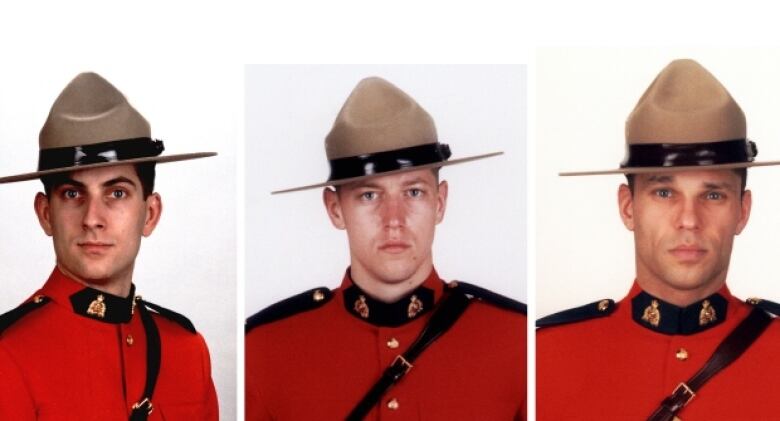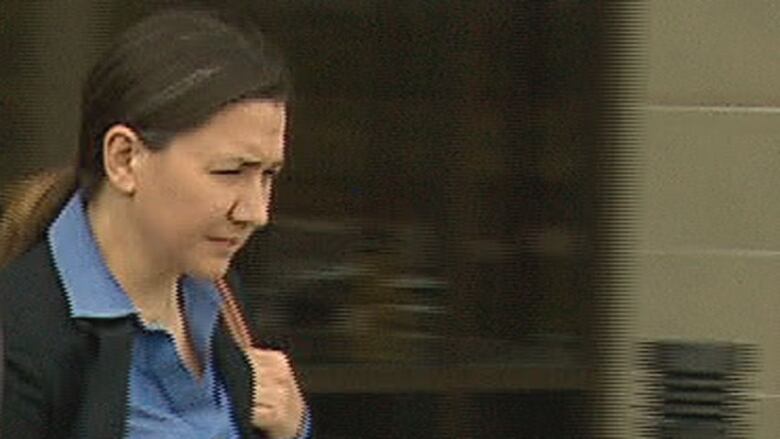N.B. Mountie testifies he 'could have easily' shot Justin Bourque if he'd had better weapon
RCMP is charged with violating Canada Labour Code in shooting deaths of 3 officers

An RCMP officertestified Tuesday he could have shot Justin Bourque, who killed three Mounties and injured two during ashooting spree in Moncton, N.B., on June 4, 2014, if he had been equipped with a better weapon.
Instead,Const. Erik White oftheCodiacdetachment felt outgunned when he came face to face with Bourquein a residential area of the city's north end.
The national police force is on trial, charged with violating four provisions of the Canada Labour Codeby allegedly failing to provide members with appropriate use-of-force equipment and related training for responding to an active threat or active shooting event, and failing to ensurethe health and safety of every person employed by the force.
'To engage in a firefight would have been ineffective.'- Erik White, RCMP constable
In court today, White described how Bourque raised his rifle to fire at him and said "it felt liked everything slowed down."
"We kind of locked eyes," said White.
The officer took cover behind the bullet-riddled SUV of his colleague,Const. Dave Ross, whose body wasslumped over the wheel after being shot in the head.
"I knew I couldn't do anything" to stop him, White testified.
- Carbines could have saved Moncton Mounties' lives, officer testifies about 2014 shootings
- RCMP warned about being accountable for injury, death years before Moncton shooting spree
- 'What were we doing before?': RCMP carbine implementation evaluated
White said that when he responded to the 911 calls, he thought, "OK, it's an idiot walking around with a gun," possibly a hunter who doesn't know how to properly transport a weapon.
The 10-year veteran said he has worked in rural areas where that was not uncommon.
At the time of the shootings,Bourquewas armed with anM305.308 semiautomatic rifle and aMossberg500 12-gauge shotgun.
"When I saw him, I don't remember seeing anything else," said White, a firearms instructor who was armed only with a pistol.
"To engage in a firefight would have been ineffective," he said, noting Bourque was out of his pistol's range.
"I believe if I'd had a carbine that day I could have easily shot at him," said White.
Might have saved colleague
With a carbine, which is a high-powered, short-barrelled rifle with a longer accurate range than a pistol or shotgun, Bourque was "well within range," he said.

Earlier in the trial, the court heard that no carbines were available to the Codiac detachmenton the night of the shootings, although some New Brunswick officerswere undergoing their first carbinetraining session at the5th Canadian Division Support Base Gagetown in Oromocto that week.
"Now we have a Colt C8 carbine," said White.
Defence challenges testimony
During cross-examination, defence lawyer Mark Ertelargued White's testimony was hypothetical.
Even if White had a carbine hanging around his neck, he might not have had enough time to fire atBourque, orBourque might have behaved differently, changing the outcome, said Ertel.
White agreed there was no way to know if he would have had enough time, but did say the carbine takes only a matter of seconds to fire. It is "point and shoot" with a "red dot."
"I've obviously had a lot of time to think" about what happened that night, he said.
"The conclusion I come to every time [is] if I had a carbine, I could have put some rounds to [Bourque]. And he wouldn't have killed [Const.] Doug Larche."
Followed sound of gunshots
White said he watched Bourquethrough the smashed rear window of the shot-out SUV on Mailhot Avenue. He saw Bourquescanning for him, he said.
But then he lost sight of Bourque and waited. Once hefelt Bourque had moved on, he removed Rossfrom the SUV and carried himto a backyard, where he realized hehad died.
White heard more shots coming from a few streets away, around Foxwood Drive, and headed in that direction, going through yards, crouching behind houses and parked cars. Then he heard more shotscoming from the other side of HildegardDrive.
'It's one of yours'
A call came over the police radio thatit looked like a civilian was down, he said. White saw a pedestrian pointing, so he wound his way down to IslingtonStreet, where he found people crowded around a body covered with a sleeping bag.
"It's one of yours," a citizen told him. It was Larche.
White said he and a civilian dragged Larche'sbody off the street to a nearby house. The door was locked, so White kicked it in and carried Larche inside.
He radioed about Larche and an ambulance was offered, but White said it was too late.
Sense of urgency
Const. Shelly Mitchell testified shesaw children outside around Bromfield Court and Mailhot Avenue when she firstheard gunshots.
"At that moment, it was very real," she said.

Mitchell sent the children inside, with directions to tell their mother to lock their door.With her gun drawn, she moved forward with a sense of urgency,trying to locate the shooter.
She came across the bodyof Const. Fabrice Gevaudan, who had been gunned down, and then that of Ross, she said, crying.
If I see thisperson, I'm going to mow him down with this car.- Shelly Mitchell, RCMPconstable
"I really wanted to get this person."
Mitchell said she asked a citizen for their car key and called dispatch to share her plan. "If I see this person, I'm going to mow him down with this car," she said.
But Mitchell realized Const. Eric Dubois was wounded and drove him to the hospital. She also called her mother and asked her to let her husband know she was OK, she said.
Then she returned to the scene. "My friends, co-workers. I wanted to stop him," she said.
Mitchell said she was "relieved" to find "there was some kind of structure." She heard leadership over the police radio and was directed to Mountain Road to reroute traffic.
She kept her eyes on the horizon, she said. "I had the sense that anything was possible."
Body armour worn incorrectly
The court also heard Tuesday from Const. Andrew Johnstone, another one of the first officers to respond to the "hot zone" in the city's north end shortly after 7 p.m.
It was only later, when he wasdispatched to the Trans-Canada Highway and Berry Mills, that he thought to put on the new hard body armourin the trunk of his vehicle, he said.
At the end of his shift, around 2 a.m., he was advised he wasn't wearing it properly.
"They had just been rolled out a couple weeks prior," he said, and he had never received any instructions on inserting the ceramic plates and adjusting the straps.
- On mobile? Get the latest details from our live blog
Asked why he didn't put the hard bodyarmouron sooner,Johnstonetearedup.
"I was trying to save the life of a friend," he said, referring to Ross.
It was seeing the wayBourque'sbullets had penetrated the soft bodyarmourof his other fatally shot colleague, Gevaudan, that made him think of the hard bodyarmour, he said.
Bourqueis serving five life sentences with no chance of parole for 75 years after pleading guilty to three counts of first-degree murder and two counts of attempted murder.
The labour codetrial, which began on April 24, is scheduled to resume on Wednesday morning. Two months have been set aside.
Each of the four charges carries a maximum fine of $1 million.
With files from Tori Weldon












_(720p).jpg)


 OFFICIAL HD MUSIC VIDEO.jpg)
.jpg)



























































































